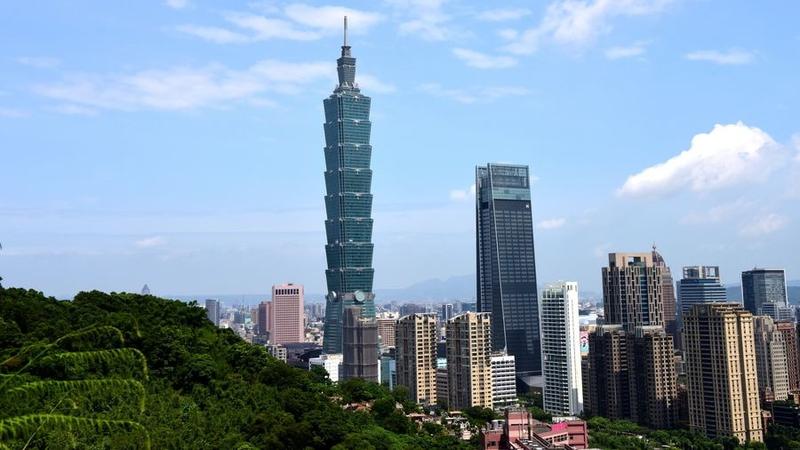 This undated photo shows the Taipei 101 skyscraper in Taipei, Southeast China's Taiwan. (PHOTO / XINHUA)
This undated photo shows the Taipei 101 skyscraper in Taipei, Southeast China's Taiwan. (PHOTO / XINHUA)
Taiwan people's dream of better livelihoods and their aspiration to communicate with the Chinese mainland after three years of COVID-19 will prominently figure during the region's leadership election in 2024, experts from both sides of the Taiwan Strait said.
The ruling Democratic Progressive Party's war rhetoric with emphasis on confronting the mainland is gradually running out of steam, as people's dissatisfaction over the DPP's seven-year governance is increasing, they said.
A recent survey conducted by the NGO Foundation for the People has revealed that Taiwan's residents are disillusioned with local Taiwan leader Tsai Ing-wen's performance and the DPP administration's reluctance to address important issues such as the income gap, affordable housing and unemployment.
The opinion poll, which coincided with the seventh anniversary of Tsai taking office in May 2016, showed that 73.9 percent of respondents are unhappy with the administration's approach toward narrowing the income gap.
According to pro-reunification political parties in Taiwan, the DPP's poor performance has triggered economic hardships and livelihood challenges in the region, and has worsened cross-Strait relations.
Taiwan people are waking up, and the DPP's approach of confrontation with the mainland and creating tension is losing its appeal.
Wang Zaixi, Vice-President, National Society of Taiwan Studies
The high cost of living, coupled with low wages and long working hours, has caused significant hardships, the parties said in a statement earlier this month. There are doubts, dissatisfaction and anxiety in the island society over the DPP's collusion with the United States to fuel conflicts, the statement said.
With Taiwan's leadership election scheduled in January, the pro-reunification parties have called on opposition candidates to reject the "Taiwan independence" agenda and resonate with public opinion to protect Taiwan from conflicts.
According to another poll conducted on May 15 by the Taiwan Public Opinion Foundation, more than 50 percent of respondents do not want the DPP to remain in power.
The 2024 election campaign has heated up in Taiwan, with the island's three major parties recently announcing their candidates.
Kuomintang, Taiwan's largest opposition party, announced New Taipei Mayor Hou You-yi as its candidate on May 17. After being nominated, Hou highlighted in his speech the incumbent administration's lack of vision to facilitate a bright future for young people in Taiwan and emphasized the need for change. He rejected "Taiwan independence" and sought support for a shift in political power.
Former Taipei mayor Ko Wen-je, who leads Taiwan's third-largest political party, the Taiwan People's Party, threw his hat into the ring on the same day.
The two announcements came after Taiwan's pro-independence ruling DPP nominated the island's deputy head Lai Ching-te in April as its candidate for the election. Lai once said that Taiwan is "an independent and sovereign nation", a claim that contradicts historical facts. His remark was strongly condemned by compatriots across the Strait.
According to a recent poll conducted by island media TVBS, Hou of the KMT is the front-runner with the support of 30 percent prospective voters, while Lai of the DPP is trailing with 27 percent. While 23 percent of prospective voters support Ko, the remaining 20 percent are undecided.
Wang Zaixi, vice-president of the National Society of Taiwan Studies in Beijing, said the majority of Taiwan people want peace, development and stability. The DPP's collusion with the US and its pursuit of "independence" while obstructing cross-Strait exchanges have led to growing dissatisfaction among the region's residents, he said.
"Taiwan people are waking up, and the DPP's approach of confrontation with the mainland and creating tension is losing its appeal," Wang added.
Wu Jung-yuan, chairman of Taiwan's Labor Party, slammed the DPP authorities for spending "exorbitant amounts of money" on purchasing weapons from the US and for attempting to send young people to battle.
The DPP has not just wasted Taiwan people's hard-earned money but has also tried to push the region to the brink of war, he said.
Chi Chia-lin, who heads the Reunification Alliance Party in Taiwan, said as the election campaign progresses in the coming months, the DPP's poor performance over the past few years will be further exposed and criticized.
Any candidate who attacks cross-Strait exchanges is expected to lose the support of voters, as the common wish of Taiwan people is deeper interactions and bonds with the mainland, especially after the pandemic, Chi added.


